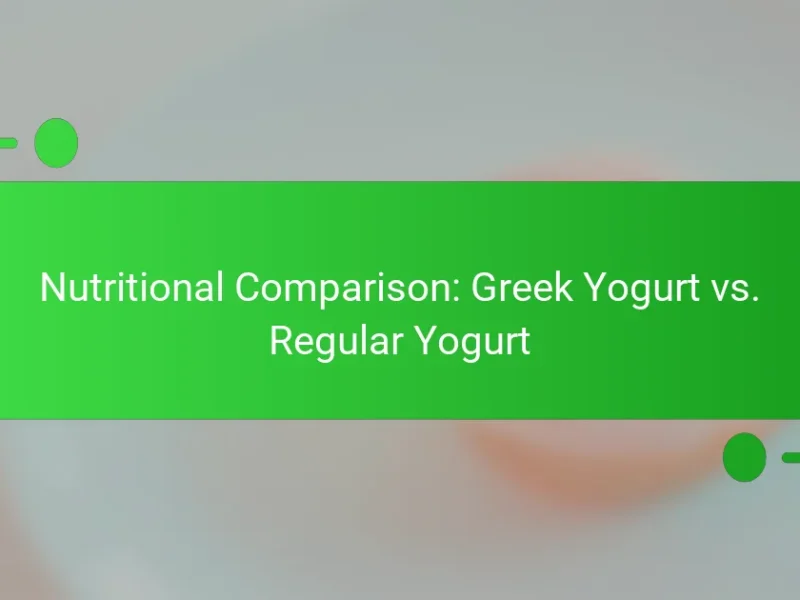Greek yogurt is a strained dairy product known for its thick texture and high protein content, making it a nutritious option in a balanced diet. It contains live active cultures that support gut health, while being lower in carbohydrates and sugar compared to regular yogurt. Nutritionally, Greek yogurt provides essential vitamins, calcium, and probiotics, contributing to weight management and improved digestion. However, consumers should be aware of potential drawbacks, including digestive discomfort from high protein levels and the presence of added sugars in flavored varieties. Various culinary applications allow for easy incorporation of Greek yogurt into meals, enhancing both nutrition and flavor.

What is Greek Yogurt?
Greek yogurt is a type of yogurt that is strained to remove whey, resulting in a thicker texture. This process also concentrates its protein content, making it higher in protein than regular yogurt. Greek yogurt typically contains live active cultures, which are beneficial for gut health. It is also lower in carbohydrates and sugar compared to traditional yogurt. Nutritionally, it provides calcium, probiotics, and essential vitamins. The unique texture and flavor make it versatile for various culinary uses. Studies show that incorporating Greek yogurt into a diet can aid in weight management and improve digestion.
How is Greek Yogurt different from regular yogurt?
Greek yogurt is different from regular yogurt primarily due to its straining process. This process removes excess whey, resulting in a thicker texture. Greek yogurt typically contains more protein than regular yogurt. For instance, it has about 15-20 grams of protein per 6-ounce serving, compared to 8-12 grams in regular yogurt. Greek yogurt also has less sugar, often containing 4-8 grams, while regular yogurt can have 12-20 grams. Additionally, Greek yogurt tends to have a creamier mouthfeel and a more tangy flavor. The nutritional differences make Greek yogurt a popular choice for those seeking higher protein and lower sugar options.
What are the key processes involved in making Greek Yogurt?
The key processes involved in making Greek yogurt include milk selection, pasteurization, cooling, fermentation, straining, and packaging. First, high-quality milk is chosen as the base ingredient. The milk is then pasteurized to eliminate harmful bacteria. After pasteurization, the milk is cooled to a specific temperature suitable for fermentation. Next, live cultures, including Lactobacillus bulgaricus and Streptococcus thermophilus, are added to the cooled milk. The mixture is then allowed to ferment for several hours, during which the cultures convert lactose into lactic acid, thickening the yogurt. After fermentation, the yogurt is strained to remove excess whey, resulting in a thicker consistency. Finally, the Greek yogurt is packaged for distribution and consumption.
What nutritional differences exist between Greek Yogurt and other yogurts?
Greek yogurt typically contains more protein and less sugar than regular yogurt. A standard serving of Greek yogurt has about 15-20 grams of protein, while regular yogurt has around 9 grams. Greek yogurt is also strained, resulting in a thicker texture and higher fat content in full-fat varieties. Regular yogurt generally has a lower fat content, especially if labeled as low-fat or non-fat.
Additionally, Greek yogurt often contains probiotics, which are beneficial for gut health. While many yogurts also contain probiotics, the specific strains and amounts can vary. Greek yogurt usually has a lower carbohydrate content compared to regular yogurt, making it a popular choice for low-carb diets.
In terms of calcium, both types provide similar amounts, though Greek yogurt may have slightly less due to the straining process. Nutritionally, the differences can vary by brand and flavor, so it’s essential to check labels for specific values.
Why is Greek Yogurt considered beneficial for health?
Greek yogurt is considered beneficial for health due to its high protein content and probiotics. It typically contains around 20 grams of protein per 7-ounce serving. This high protein level supports muscle growth and repair. Additionally, Greek yogurt is rich in probiotics, which promote gut health. Probiotics can enhance digestion and boost the immune system. Greek yogurt also has lower sugar content compared to regular yogurt. This makes it a healthier choice for those monitoring their sugar intake. Furthermore, it provides essential nutrients like calcium and vitamin B12. These nutrients contribute to bone health and energy metabolism. Overall, Greek yogurt is a nutritious option that supports various aspects of health.
What are the primary health benefits of consuming Greek Yogurt?
Consuming Greek yogurt offers several primary health benefits. It is rich in protein, providing about 10 grams per 100 grams serving. This high protein content supports muscle growth and repair. Greek yogurt also contains probiotics, which promote gut health by enhancing the balance of beneficial bacteria. Additionally, it is lower in sugar compared to regular yogurt, making it a healthier option for those monitoring sugar intake.
Moreover, Greek yogurt is an excellent source of calcium, essential for maintaining strong bones. It contains vitamins B12 and B2, which are important for energy metabolism. Studies show that consuming Greek yogurt may aid in weight management due to its satiating properties. Furthermore, it helps in regulating blood pressure due to its potassium content.
How does Greek Yogurt contribute to digestive health?
Greek yogurt contributes to digestive health primarily through its probiotic content. Probiotics are beneficial bacteria that support gut health. They help maintain a balanced gut microbiome. A healthy microbiome is essential for effective digestion. Greek yogurt typically contains live cultures like Lactobacillus and Bifidobacterium. These cultures can enhance the breakdown of food. They also improve nutrient absorption in the digestive tract. Research shows that regular consumption of probiotics can alleviate symptoms of digestive disorders. For instance, a study published in the Journal of Dairy Science found that probiotics can reduce bloating and improve gut transit time. Thus, Greek yogurt serves as a valuable food for promoting digestive well-being.
What role does Greek Yogurt play in a balanced diet?
Greek yogurt plays a significant role in a balanced diet as a source of protein and probiotics. It contains approximately 10 grams of protein per 100 grams, which supports muscle maintenance and repair. The probiotics found in Greek yogurt aid in digestive health by promoting a healthy gut microbiome. Additionally, Greek yogurt is lower in sugar compared to regular yogurt, making it a healthier option for those monitoring their sugar intake. It is also rich in calcium, providing about 110 mg per 100 grams, which is essential for bone health. Incorporating Greek yogurt into meals can enhance nutrient intake and contribute to overall dietary balance.
How can Greek Yogurt be integrated into daily meals?
Greek yogurt can be integrated into daily meals in various ways. It serves as a nutritious breakfast option when paired with fruits and nuts. Adding it to smoothies enhances both flavor and protein content. It can also be used as a base for salad dressings, providing creaminess without excess calories. Incorporating Greek yogurt into recipes like pancakes or muffins boosts their protein levels. Using it as a topping for baked dishes adds richness and flavor. Additionally, it can be enjoyed as a snack with honey or granola. These methods promote a balanced diet by offering health benefits such as increased protein intake and improved digestion.
What portion sizes of Greek Yogurt are recommended for optimal health?
A recommended portion size of Greek yogurt for optimal health is typically 150 to 200 grams per serving. This amount provides a balance of protein, probiotics, and nutrients. Consuming this portion can support digestive health and muscle maintenance. Research indicates that this serving size offers about 15 to 20 grams of protein. This aligns with dietary guidelines for protein intake. Regular consumption of this portion can contribute to overall wellness and satiety.

What are the potential drawbacks of Greek Yogurt?
Greek yogurt has potential drawbacks that consumers should consider. One drawback is its higher protein content, which may lead to digestive discomfort for some individuals. Another issue is its often higher sugar content in flavored varieties, which can contribute to excessive calorie intake. Additionally, Greek yogurt can be more expensive than regular yogurt, making it less accessible for some consumers. Lactose intolerance can also pose a challenge, as it may cause gastrointestinal issues for those sensitive to lactose. Lastly, some brands may contain additives or thickeners, which could detract from its health benefits.
Are there any concerns regarding Greek Yogurt consumption?
Greek yogurt consumption can raise several concerns. One issue is its high protein content, which may not be suitable for individuals with certain kidney conditions. Additionally, some Greek yogurts contain added sugars, which can lead to increased calorie intake. Lactose intolerance is another concern, as some people may experience digestive issues. Furthermore, the presence of artificial additives in some brands can be problematic for health-conscious consumers. Lastly, overconsumption may lead to excessive calorie intake, contributing to weight gain.
What should individuals with lactose intolerance consider when consuming Greek Yogurt?
Individuals with lactose intolerance should consider the lower lactose content of Greek yogurt. Greek yogurt is strained, which reduces lactose levels compared to regular yogurt. Many brands offer lactose-free options specifically designed for those with intolerance. Additionally, the presence of probiotics in Greek yogurt can aid digestion. Probiotics help break down lactose, making it easier to tolerate. Individuals should start with small amounts to assess their tolerance. Reading labels for lactose content is crucial. Consulting a healthcare professional can provide personalized advice.
How do added sugars in flavored Greek Yogurt affect its health benefits?
Added sugars in flavored Greek yogurt can diminish its health benefits. The presence of added sugars increases calorie content without providing essential nutrients. High sugar intake is linked to obesity, type 2 diabetes, and heart disease. For instance, a 150g serving of flavored Greek yogurt can contain up to 20 grams of added sugars. This amount exceeds the recommended daily limit for added sugars in a balanced diet. As a result, the potential benefits of protein and probiotics in Greek yogurt may be overshadowed by the negative effects of excessive sugar. Thus, consuming flavored Greek yogurt with high added sugars can compromise overall health advantages.
How does Greek Yogurt fit into various dietary lifestyles?
Greek yogurt is versatile and fits into various dietary lifestyles. It is high in protein, making it suitable for those focused on muscle building. The probiotics in Greek yogurt support gut health, appealing to individuals prioritizing digestive wellness. Its low carbohydrate content makes it a good choice for low-carb diets, such as ketogenic. Greek yogurt can be part of vegetarian diets, as it is a dairy product rich in nutrients. For individuals following a Mediterranean diet, Greek yogurt is a staple, complementing fruits and nuts. Additionally, it can be used in meal prep, enhancing dishes while maintaining nutritional value. Studies show that incorporating Greek yogurt can improve overall diet quality due to its nutrient density.
What are the benefits of Greek Yogurt for vegetarians and vegans?
Greek yogurt offers several benefits for vegetarians and vegans. It is rich in protein, providing approximately 10 grams per serving. This high protein content supports muscle maintenance and repair. Greek yogurt also contains probiotics, which promote gut health. These beneficial bacteria can improve digestion and enhance immune function. Additionally, Greek yogurt is lower in sugar compared to regular yogurt. This makes it a healthier choice for those monitoring their sugar intake. It also offers calcium, which is essential for bone health. For vegans, plant-based Greek yogurt alternatives are available, often made from almond or coconut milk. These alternatives can provide similar benefits, including protein and probiotics.
How can Greek Yogurt support weight loss or management goals?
Greek yogurt can support weight loss or management goals due to its high protein content and low sugar levels. The protein in Greek yogurt promotes satiety, helping individuals feel fuller for longer. This can reduce overall calorie intake throughout the day. Additionally, Greek yogurt is lower in carbohydrates compared to regular yogurt, making it a better choice for those managing their weight.
Research indicates that higher protein diets can lead to greater weight loss. A study published in the American Journal of Clinical Nutrition found that individuals consuming high-protein diets experienced increased weight loss compared to those on lower-protein diets. Greek yogurt also contains probiotics, which may aid digestion and improve gut health, further supporting weight management.
In summary, Greek yogurt’s protein content, lower sugar levels, and potential digestive benefits make it an effective food choice for weight loss and management.

What are some practical tips for incorporating Greek Yogurt into your diet?
Incorporating Greek yogurt into your diet can enhance nutrition and flavor. Use it as a base for smoothies to add creaminess and protein. Substitute it for sour cream in recipes to reduce fat while maintaining taste. Mix Greek yogurt with fruits and nuts for a healthy snack. Use it in salad dressings for added creaminess without excess calories. Add it to baked goods for moisture and protein. Incorporate it into breakfast by topping oatmeal or granola. Use it as a marinade for meats to tenderize and flavor. These methods can help you enjoy Greek yogurt’s benefits easily.
What are some easy recipes that include Greek Yogurt?
Greek yogurt can be used in various easy recipes. One simple option is a Greek yogurt parfait. Layer Greek yogurt with fresh fruits and granola for a nutritious breakfast. Another recipe is a creamy Greek yogurt dip. Mix Greek yogurt with herbs, garlic, and lemon juice for a tasty snack. A third option is Greek yogurt pancakes. Combine Greek yogurt with flour, eggs, and baking powder for fluffy pancakes. Additionally, Greek yogurt can be used in smoothies. Blend Greek yogurt with fruits and spinach for a healthy drink. These recipes showcase the versatility of Greek yogurt in everyday meals.
How can Greek Yogurt be used as a substitute in cooking and baking?
Greek yogurt can be used as a substitute for sour cream, mayonnaise, and heavy cream in cooking and baking. It provides a similar creaminess and tangy flavor. In recipes, Greek yogurt can replace sour cream in dips and dressings. It can also substitute mayonnaise in sandwiches and salads for a healthier option. When baking, Greek yogurt can replace heavy cream in cakes and muffins, adding moisture and reducing fat content. It also enhances protein content in dishes. The use of Greek yogurt in these ways maintains texture while improving nutritional value.
What are some creative ways to enjoy Greek Yogurt as a snack?
Mix Greek yogurt with honey and nuts for a sweet and crunchy snack. This combination provides protein and healthy fats. Add fresh fruits like berries or sliced bananas for added flavor and nutrients. Create a savory dip by mixing Greek yogurt with herbs and spices. This dip pairs well with vegetables or whole grain crackers. Freeze Greek yogurt in molds for a refreshing frozen treat. This method retains the nutritional benefits while offering a cool snack. Layer Greek yogurt with granola and fruit in a parfait for a visually appealing and satisfying option. These creative ways enhance the enjoyment of Greek yogurt while maintaining its health benefits.
Greek yogurt is a strained dairy product known for its thicker texture and higher protein content compared to regular yogurt. This article explores the nutritional differences between Greek yogurt and other yogurts, highlighting its benefits such as supporting digestive health, aiding in weight management, and providing essential nutrients like calcium and probiotics. It also discusses practical ways to incorporate Greek yogurt into daily meals, potential drawbacks, and how it fits into various dietary lifestyles, making it a versatile option for enhancing a balanced diet.


